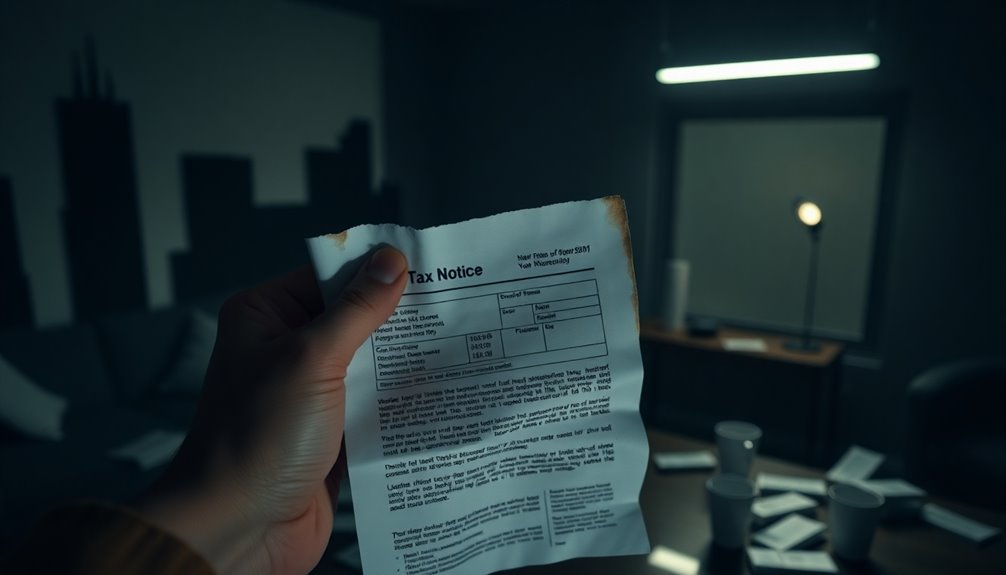If you can't pay your taxes, don't panic. It's important to act quickly. The IRS offers payment plans that let you pay your tax debt over time. You can apply for a short-term or long-term plan based on your total owe. Be aware that penalties and interest can add up if you wait too long, potentially leading to collection actions. You should file all required returns to qualify for a plan. Consider seeking help from a tax professional who can guide you through this process and help you understand your options better. There's more to explore here.
Key Takeaways
- Assess your tax liability and determine the total amount owed, including penalties and interest.
- Explore IRS payment plan options, including short-term and long-term arrangements based on your tax debt.
- Ensure all required tax returns are filed before applying for a payment plan to remain eligible.
- Consider seeking professional assistance to navigate complex tax laws and negotiate manageable payment plans.
- Stay compliant by communicating with the IRS and maintaining accurate records of payments and correspondence.
Understanding Your Tax Liability

When it comes to understanding your tax liability, it's crucial to grasp what it entails. Your tax liability is the total amount of taxes you owe to federal, state, or local governments, which includes income taxes, capital gains taxes, and other taxes. It can affect individuals, businesses, or other entities and is calculated based on your income, deductions, credits, and other relevant factors.
To calculate your tax liability, start by determining your gross income and adjusted gross income (AGI). After applying deductions and exemptions, you'll arrive at your taxable income. Tax rates are then applied based on income brackets, and if you're self-employed, you'll also need to consider self-employment taxes for Social Security and Medicare. Understanding your tax liability is vital since it is calculated annually during tax filing season from January to April.
Keep in mind that your tax liability can be influenced by various factors, including your income level, the type of income you earn, and the local tax laws in your state.
Additionally, claiming deductions, exemptions, and tax credits can help reduce your overall tax liability. Understanding these elements can empower you to manage your financial responsibilities more effectively.
Options for Payment Plans

If you find yourself unable to pay your taxes in full, don't panic—there are options available to help you manage your tax debt. You can set up a payment plan through the IRS, and there are a couple of ways to apply.
For convenience, use the IRS' Online Payment Agreement tool, which requires an online account or an ID.me account. Make sure you have a valid email address, photo ID, your Social Security number, and access to a smartphone or webcam.
If you prefer, you can apply by calling the IRS or filing Form 9465 by mail—both options also have no setup fee. The IRS provides both short-term and long-term payment plans to accommodate different repayment needs.
You can choose between a short-term payment plan, allowing you to pay off your debt within 180 days, or a long-term payment plan, where you'll make monthly installments for up to six years.
Automatic debit is the most convenient payment method, ensuring timely payments. Keep in mind that interest and penalties will continue to accrue until you pay your balance, so make payments as large as possible to minimize these charges.
Eligibility for Payment Plans

Understanding the eligibility criteria for tax payment plans is crucial for anyone facing tax debt. The maximum debt amount plays a significant role in determining your options. For a short-term plan, your combined tax, penalties, and interest must be under $100,000. If you're looking at a long-term plan, that limit drops to $50,000. Businesses have a stricter cap of $25,000 for debts from the current and preceding tax year.
Before you can enter a payment plan, all required tax returns must be filed, typically covering the last six years for individual taxpayers. Additionally, IRS payment plans allow taxpayers to pay taxes owed over time, providing flexibility in managing tax debt.
The payment periods differ as well; short-term plans need to be settled within 180 days, while long-term plans can extend up to 72 months or until the IRS collection statute of limitations runs out.
If your debt exceeds $25,000, keep in mind that payments must be made through automatic withdrawals from your bank account.
Lastly, you'll need to ensure that your full tax bill is paid off before the 10-year collection statute expires. Understanding these criteria sets the foundation for successfully managing your tax obligations.
Applying for Payment Plans

Applying for a payment plan can be straightforward, especially if you know the right steps to take. You can apply online, by phone, by mail, or in person, depending on what works best for you.
If you choose to apply online, make sure you have a valid email address, photo identification, and your Social Security number or tax ID number ready. By the end of 2022, 9.3 million Americans owed over $120 billion in back taxes, highlighting the importance of exploring your options.
You'll need to create an ID.me account for identity verification if you haven't done so already. Log into the IRS' Online Payment Agreement tool, and enter your filing status, the amount owed, and your preferred monthly payment.
Online applications often get approved within minutes, and setting up automatic payments can help minimize fees.
If you'd rather speak to someone, call the IRS main line at 800-829-1040 for individual plans. IRS representatives can guide you through the application process and answer any questions.
For those who prefer paper, download Form 9465 from the IRS website, fill it out, and mail it along with your tax return.
You should receive a response within 30 days regarding your request.
Fees Associated With Plans

When setting up a payment plan with the IRS, it's important to be aware of the associated fees that can impact your overall costs. If you apply online for a Direct Debit long-term plan, you'll pay a setup fee of $31. However, if you choose to apply by phone, mail, or in person, that fee jumps to $107.
For non-Direct Debit long-term plans, the fees are even higher—$130 online and $225 through other methods. Low-income taxpayers can apply online for a reduced fee of $43. Additionally, keeping in mind that timely tax payments can prevent additional interest and penalties from accruing is crucial for effective financial management.
Keep in mind that ongoing penalties and interest will continue to accrue, regardless of your payment plan. You'll face a late payment penalty of 0.5% of unpaid taxes each month, plus a late filing penalty of 5% per month, both capped at 25%.
If you need to change your payment plan, expect a fee of $10 for online changes or $89 for changes made by phone or mail. Fortunately, low-income taxpayers can also benefit from waived or reduced fees in certain circumstances.
Being aware of these fees can help you manage your tax obligations more effectively.
Minimum Payment Requirements

Many taxpayers find themselves wondering about the minimum payment requirements for an IRS installment plan.
Generally, the minimum monthly payment equals your total tax debt divided by 72, unless you specify a different amount. If you owe between $10,000 and $50,000, you'll need to pay via direct debit or payroll deduction. The IRS encourages higher payments to reduce interest and penalties.
For balances under $10,000, you might get a "guaranteed" installment agreement automatically, provided all your tax returns are filed and payments are current.
If you're dealing with a balance between $10,000 and $50,000, you can qualify for a "streamlined" installment plan without submitting extra financial information, as long as you don't already have an existing agreement.
Benefits of Payment Plans

A payment plan can offer significant advantages for taxpayers struggling to meet their tax obligations. One of the biggest benefits is the ability to customize your monthly payment amount, and these plans can last up to 72 months, sometimes even 84 months. This flexibility helps reduce your financial burden and increases your chances of successfully fulfilling the agreement.
Additionally, penalties and interest under an installment agreement are lower than what you'd face otherwise. With the IRS's interest rates typically at 8% plus a 0.25% monthly penalty, you'll save money compared to personal loans. Once you start the installment agreement, certain penalties are reduced, making the overall cost of repayment more manageable. Furthermore, you can take advantage of reduced penalties compared to other payment methods.
Moreover, entering into a payment plan protects you from IRS collections. As long as you comply, the IRS can't garnish your wages, levy your bank accounts, or issue federal tax liens. This protection helps maintain your credit score and keeps your assets safe.
Finally, by setting up a payment plan, you initiate the IRS's 10-year collection statute, giving you more time to pay off your debt without the constant threat of collection actions.
Consequences of Non-Payment

While payment plans can alleviate some financial stress, failing to pay your taxes can lead to severe consequences. First, penalties and interest pile up quickly.
You'll face a late-payment penalty of 0.5% per month, capped at 25%, plus interest accruing at the federal short-term rate plus 4%, compounded daily. This can add up to a staggering 47.5% of your tax liability when you combine failure-to-file and failure-to-pay penalties.
Moreover, the IRS can take collection actions against you. They may file a Notice of Federal Tax Lien, alerting creditors of their rights to your assets. A tax levy could seize your bank accounts, wages, or even property. Ignoring IRS notices can lead to serious repercussions, including wage garnishment and seizure of personal property.
If your federal tax debt exceeds $62,000, you might even face restrictions on your passport.
In extreme cases, tax evasion could lead to jail time of up to five years and hefty fines. The IRS takes this seriously and routinely reviews your financial situation, potentially renewing collection efforts.
Ignoring IRS notices won't help; they'll continue sending reminders about your outstanding balance. You must address these issues promptly to avoid escalating consequences.
Seeking Professional Assistance

Facing tax issues can be overwhelming, but seeking professional assistance can make a significant difference. Tax professionals can help you assess your tax liability, determining the exact amount you owe while identifying any potential refunds. They can provide guidance on navigating complex tax laws to ensure you make informed decisions about your tax situation.
They'll evaluate penalties and interest accrued and assess your eligibility for tax relief programs, ensuring you stay compliant with tax laws.
When it comes to preparing and filing overdue tax returns, professionals can gather the necessary documents for each missed year. They'll use tax preparation software or their expertise to file your returns correctly, correcting any unreported income or missed deductions. This step is crucial for reducing penalties and interest.
If you need to negotiate a payment plan, tax experts can help establish a manageable schedule, whether it's a short-term plan or a long-term installment agreement. They'll work with the IRS to mitigate additional penalties and ensure you comply with the agreed terms.
Finally, it's essential to be cautious about scams. Verify the legitimacy of any service provider you consider and avoid those promising unrealistic outcomes. Stick to IRS-certified volunteers or approved programs to protect yourself.
Frequently Asked Questions
Can I Negotiate the Amount I Owe With the IRS?
Yes, you can negotiate the amount you owe with the IRS through an Offer in Compromise (OIC).
You'll need to prove that paying your full tax debt would cause you financial hardship. Start by filing Form 656 and Form 433-A.
Keep in mind that acceptance rates are low, so be prepared for a thorough review of your finances.
If accepted, you can pay in a lump sum or through installments.
What Happens if I Miss a Payment?
If you miss a payment, the IRS starts adding penalties and interest to your balance.
You'll face a failure-to-pay penalty of 0.5% per month, plus interest calculated daily.
The IRS sends notices reminding you of the balance due and can escalate communication if you don't respond.
Ignoring the payment can lead to collection actions, including wage garnishments or liens on your property.
It's crucial to address missed payments as soon as possible.
Can I Change My Payment Plan Later?
Yes, you can change your payment plan later.
You can adjust your monthly payment amount, due date, or even switch to a Direct Debit agreement using the IRS Online Payment Agreement tool.
If you prefer, you can contact the IRS directly at 800-829-1040 for assistance.
Just remember, any changes need IRS approval, so it's wise to keep track of your payments to avoid defaulting on your plan.
Will My Credit Score Be Affected by a Payment Plan?
Your credit score won't be affected by an IRS payment plan.
The IRS doesn't report these plans or any back taxes to credit bureaus, so you don't need to worry about it showing up on your credit report.
However, keep in mind that failing to pay your taxes or filing late can lead to penalties and tax liens, which might indirectly impact your creditworthiness.
It's best to stay proactive in addressing any tax issues.
How Do I Cancel My Payment Plan?
To cancel your payment plan, you've got several options.
Call the IRS e-file Payment Services at 1-888-353-4537 or use the EFTPS Tax Payment number at 1-800-555-3453.
You can also log into the IRS online system, select "Payments," and choose "Cancel a Payment."
Remember to have your EIN or SSN and the last eight digits of the EFT Acknowledgment Number handy for the cancellation process.
Conclusion
If you can't pay your taxes, don't panic—there are options available. Exploring payment plans can ease your financial burden and help you manage your tax liability. Remember, acting quickly is crucial to avoid penalties and interest. Seek professional assistance if you're feeling overwhelmed; they can guide you through the process and ensure you make informed decisions. By taking proactive steps, you can regain control of your financial situation and move forward with confidence.









